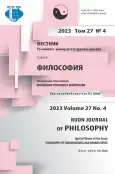Проблемное поле философских дискурсов о применении систем искусственного интеллекта в социуме
- Авторы: Цвык В.А.1, Цвык И.В.1,2, Павлова Т.П.2
-
Учреждения:
- Poссийский университет дружбы народов
- Московский авиационный институт (национальный исследовательский университет)
- Выпуск: Том 27, № 4 (2023): ФИЛОСОФИЯ СОЗНАНИЯ И НЕЙРОНАУКИ
- Страницы: 928-939
- Раздел: ФИЛОСОФИЯ СОЗНАНИЯ И НЕЙРОНАУКИ
- URL: https://journal-vniispk.ru/2313-2302/article/view/325222
- DOI: https://doi.org/10.22363/2313-2302-2023-27-4-928-939
- EDN: https://elibrary.ru/TMOJFW
- ID: 325222
Цитировать
Полный текст
Аннотация
Актуальность исследования заключается в необходимости понять содержание стратегических задач в отношении применения интеллектуальных технологий. Разработка и применение искусственного интеллекта в различных отраслях деятельности человека несут в себе потенциал глобальных изменений в обществе, что в методологическом плане повышает актуальность рассмотрения этих проблем. Исследование этических проблем искусственного интеллекта в концепции устойчивого развития общества связано с динамичным развитием инновационных технологий искусственного интеллекта (ИИ), которые рассматриваются как процесс становления нового техносубъекта в контексте развития нейронаук. В исследовании подчеркивается, что развитие искусственного интеллекта выступает инновационной формой развития техники, когда формируется новый вид - человека-машинный техносубъект. Авторами выявляются социальные проблемы применения искусственного интеллекта, так как цифровизация жизни становится глобальным антропологическим вызовом. Инновации искусственного интеллекта напрямую связаны с целым рядом этических проблем, так как вносят не только положительных вклад в устойчивое развитие общества, но и являются причиной дегуманизации отношений между людьми и обществом. На основе анализа качественных изменений в сфере научных и технологических исследований можно сделать вывод, что использование человеко-машинных устройств становится неизбежностью, человечество должно выработать этические ориентиры применения систем ИИ.
Об авторах
Владимир Анатольевич Цвык
Poссийский университет дружбы народов
Автор, ответственный за переписку.
Email: tsvyk-va@rudn.ru
ORCID iD: 0000-0002-7814-5504
доктор философских наук, профессор, заведующий кафедрой этики, факультет гуманитарных и социальных наук
Российская Федерация, 117198, Москва, ул. Миклухо-Маклая, д. 6Ирина Вячеславовна Цвык
Poссийский университет дружбы народов; Московский авиационный институт (национальный исследовательский университет)
Email: tsvykirina@mail.ru
ORCID iD: 0000-0001-8597-2498
доктор философских наук, профессор, кафедра философии, Московский авиационный институт (национальный исследовательский университет); доцент, очно-заочное отделение, факультет гуманитарных и социальных наук, Российский университет дружбы народов
Российская Федерация, 117198, Москва, ул. Миклухо-Маклая, д. 6; Российская Федерация, 125993, Москва, Волоколамское шоссе, д. 4Татьяна Петровна Павлова
Московский авиационный институт (национальный исследовательский университет)
Email: vptp52@mail.ru
ORCID iD: 0000-0002-2674-496X
кандидат философских наук, доцент, кафедра философии
Российская Федерация, 125993, Москва, Волоколамское шоссе, д. 4Список литературы
- Kvon DA, Pavlova TP, Tsvyk IV. Philosophy and methodology of artificial intelligence. Мoscow: MAI publ.; 2021. (In Russian).
- Crawford K. Artificial Intelligence’s White Guy Problem. The New York Times, Opinion. 25 June 2016. Available from: https://www.nytimes.com/2016/06/26/opinion/sunday/artificial-intelligences-white-guy-problem.html (accessed: 05.06.2023)
- Habermas Yu. Moral consciousness and communicative action. Saint Petersburg: Nauka publ.; 2003. (In Russian).
- Ivanov DV. Virtualization of society. Version 2.0. Saint Petersburg: Peterburgskoe Vostokovedenie publ.; 2002. (In Russian).
- Turing A. The Imitation Game: about ciphers, codes and artificial intelligence. Мoscow: Rodina publ.; 2019. (In Russian).
- Zsigmond T, Machov R, Korcsmáro E. The Ethics and Factors Influencing Employees Working in the Slovak SME Sector. Acta Polytechnica Hungarica. 2022;18(11):171-190. https://doi.org/10.12700/aph.18.11.2021.11.10
- Tsvyk VA, Tsvyk IV. Social problems of development and application of artificial intelligence. RUDN Journal of Sociology. 2022;1(22):58-69. (In Russian). https://doi.org/10.22363/2313-2272-2022-22-1-58-69
- Ashley KD. Artificial Intelligence and Legal Analytics: New Tools for Law Practice in the Digital Age. Cambridge: Cambridge University Press; 2017.
- Frankish K, Ramsey WM. The Cambridge handbook of artificial intelligence. Cambridge: Cambridge University Press; 2014.
- Wiener N. Machines are more inventive than people? Available from: http://grachev62.narod.ru/cybern/append_4.htm (accessed: 11.06.2023). (In Russian).
- Simondon J. About the mode of existence of technical objects. Translit. 2011;(9):94-105. (In Russian).
- Chernigovskaya TV. The Cheshire smile of Schrodinger’s cat: language and consciousness. Мoscow: Yazyki slavyanskoj kultury publ.; 2017. (In Russian).
- Nazaretyan AP. Intelligence in the Universe: history, formation, prospects. Мoscow: Nedra publ.; 1991. (In Russian).
- Nyholm S. Humans and Robots: Ethics, Agency, and Anthropomorphism. Rowman & Littlefield Publishers; 2020.
- Bostrom N. Artificial intelligence. Stages, Threats. Strategies. Мoscow: Mann, Ivanov and Ferber; 2016. (In Russian).
- Nikitina EA. Artificial intelligence: philosophy, methodology, innovations. Philosophical Problems of IT & Cyberspace. 2014;(2):108-122. (In Russian). https://doi.org/10.17726/philit.165.12
- Sivirinov BS. Technology and society in the future: symbiosis or cyborgization. Living Standards of the Population in the Regions of Russia. 2017;3(13):93-99. (In Russian). https://doi.org/10.12737/article_595cd7fba8a508.16718012
- Tsvyk VA, Tsvyk IV. Moral values of professional activity in information society. RUDN Journal of Sociology. 2019;3(19):530-542. https://doi.org/10.22363/2313-2272-2019-19-3-530-542
- Payne K. Artificial Intelligence: A Revolution in Strategic Affairs? Survival Magazine. 2018;5(60):7-32. https://doi.org/10.1080/00396338.2018.1518374
Дополнительные файлы









